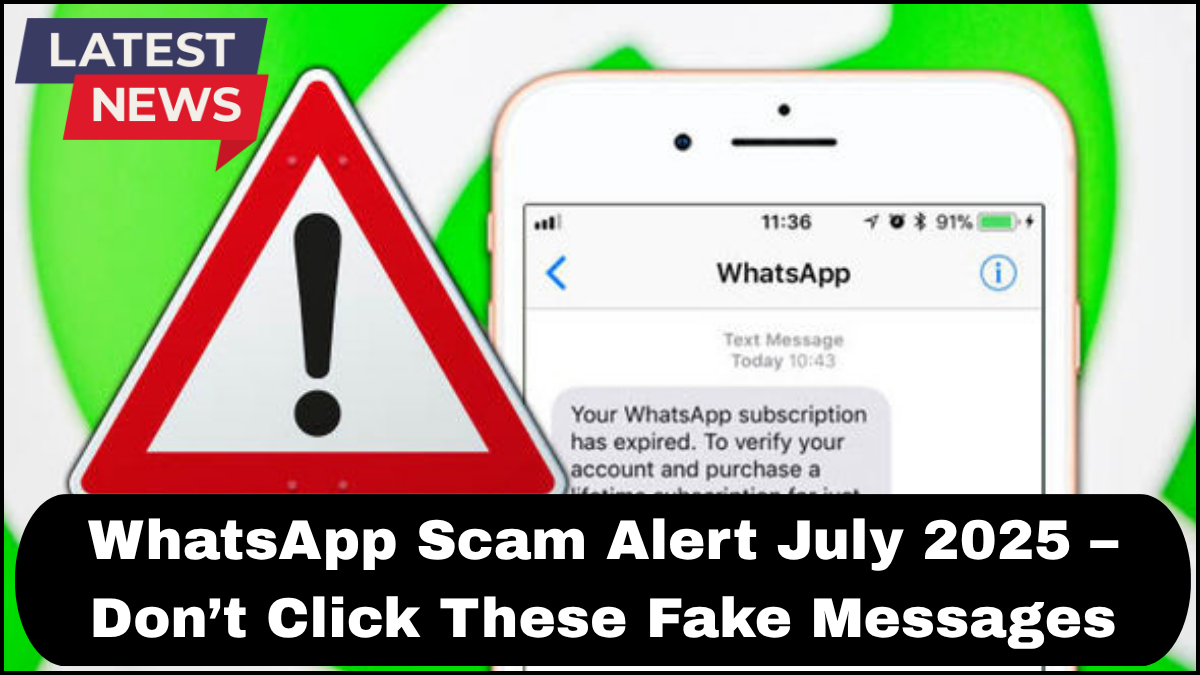WhatsApp users across India are once again being targeted by a fresh wave of scams. July 2025 has seen a sharp rise in fraudulent messages spreading via the popular messaging app, prompting cybersecurity experts and authorities to issue a WhatsApp Scam Alert. If you’ve received messages promising rewards, job offers, or fake government schemes—stop. Do not click.

What Is the WhatsApp Scam Alert All About?
The current scam campaign involves phishing messages disguised as legitimate offers. These messages are often sent from unknown numbers or spoofed business accounts, making them look convincing. The goal is simple: to trick users into revealing sensitive data or initiating payments that result in UPI fraud or identity theft.
In many cases, these messages include links that lead to fake websites mimicking government portals, banks, or popular brands. Once clicked, users may be prompted to enter personal information, banking credentials, or UPI PINs. In some cases, simply clicking the link can install spyware or malware on your device.
How These Phishing Messages Work
These scams are evolving. Unlike earlier versions that had obvious typos or poorly designed layouts, today’s phishing messages look polished. Here’s how they typically operate:
- Bait Message: You receive a message saying you won a lottery, qualified for a government subsidy, or are eligible for a special offer.
- Urgency Trigger: Scammers add phrases like “Offer valid only for 24 hours” or “Click now to avoid deactivation.”
- Link or QR Code: The message includes a link or QR code leading to a fake login or payment page.
- Data Harvesting: Once you enter your details or scan the code, your data is either sold or used for UPI fraud.
Real Examples Reported in July 2025
- A fake message circulating as a “PM UPI Bonus” asked users to scan a QR code to receive Rs. 2,000 as part of a fake government scheme. Victims lost money instantly after scanning.
- Another phishing message promised users a “Work From Home Opportunity” through a well-known brand. The link led to a form that collected Aadhaar numbers, PAN details, and UPI credentials.
- Cybercrime units in Delhi and Mumbai have reported over 4,000 cases linked to WhatsApp scams this month alone.
How to Identify a WhatsApp Scam
Even the most tech-savvy users can get fooled. But there are warning signs you can watch for:
- Unverified senders or international numbers
- Too-good-to-be-true offers
- Poor grammar or excessive emojis
- Requests for sensitive information like OTPs, UPI PINs, or bank details
- URLs that mimic popular domains but have slight misspellings (e.g., “g0vt-india.org”)
What to Do If You Receive a Suspicious Message
- Do not click on any links or scan QR codes.
- Block and report the number to WhatsApp.
- Forward the message to the Ministry of Home Affairs’ Cyber Crime Helpline (1930) or visit cybercrime.gov.in.
- Warn others in your contacts to avoid similar traps.
How to Stay Safe on WhatsApp
- Enable two-step verification on WhatsApp.
- Regularly update your app to patch known security holes.
- Avoid sharing sensitive personal or financial information over messages.
- Use a trusted antivirus or anti-malware tool on your smartphone.
- Double-check official schemes on government websites before taking action.
Final Thoughts
The July 2025 WhatsApp Scam Alert is not just a passing trend—it’s a warning. With the increasing sophistication of these phishing messages, everyone must be more vigilant. Always think twice before clicking, and when in doubt, verify through official channels.
FAQs
Q1. What should I do if I clicked on a scam link?
Immediately disconnect from the internet, run a malware scan on your device, and contact your bank to secure your account.
Q2. Can scammers access my WhatsApp account?
Yes, especially if you share your OTP or enable remote access through apps they recommend. Always use two-step verification.
Q3. How can I report a WhatsApp scam?
You can report scams directly through WhatsApp or contact India’s Cyber Crime Helpline at 1930.
Q4. Are phishing messages only sent via WhatsApp?
No. Scammers also use SMS, email, Telegram, and even social media DMs. WhatsApp is just a convenient and popular method.
Q5. What is UPI fraud?
UPI fraud involves unauthorized transactions via the Unified Payments Interface. Scammers trick users into sending money or revealing their UPI credentials.
Stay safe. Stay informed.
click here to learn more